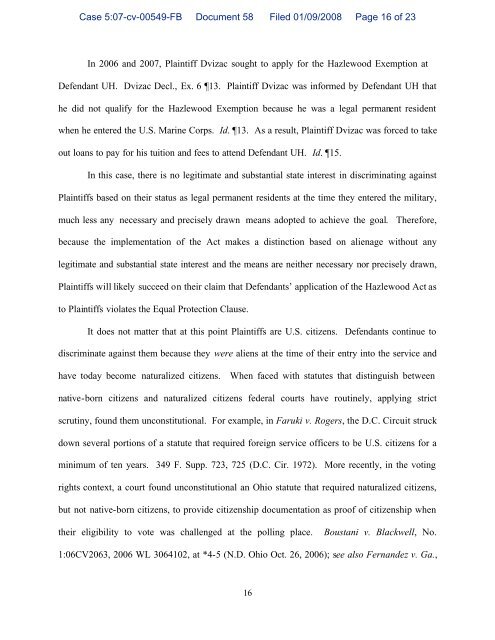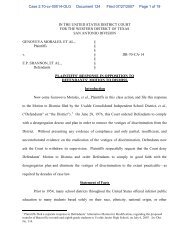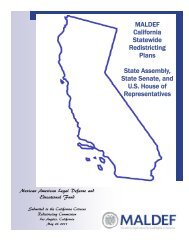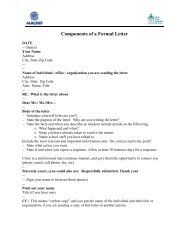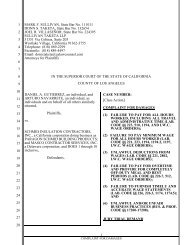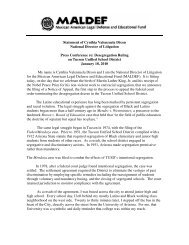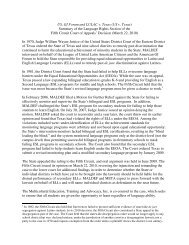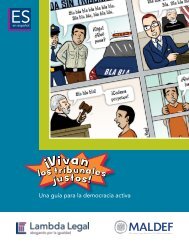plaintiffs' motion for preliminary injunction and brief in - maldef
plaintiffs' motion for preliminary injunction and brief in - maldef
plaintiffs' motion for preliminary injunction and brief in - maldef
You also want an ePaper? Increase the reach of your titles
YUMPU automatically turns print PDFs into web optimized ePapers that Google loves.
Case 5:07-cv-00549-FB Document 58 Filed 01/09/2008 Page 16 of 23<br />
In 2006 <strong>and</strong> 2007, Pla<strong>in</strong>tiff Dvizac sought to apply <strong>for</strong> the Hazlewood Exemption at<br />
Defendant UH. Dvizac Decl., Ex. 6 13. Pla<strong>in</strong>tiff Dvizac was <strong>in</strong><strong>for</strong>med by Defendant UH that<br />
he did not qualify <strong>for</strong> the Hazlewood Exemption because he was a legal permanent resident<br />
when he entered the U.S. Mar<strong>in</strong>e Corps. Id. 13. As a result, Pla<strong>in</strong>tiff Dvizac was <strong>for</strong>ced to take<br />
out loans to pay <strong>for</strong> his tuition <strong>and</strong> fees to attend Defendant UH. Id. 15.<br />
In this case, there is no legitimate <strong>and</strong> substantial state <strong>in</strong>terest <strong>in</strong> discrim<strong>in</strong>at<strong>in</strong>g aga<strong>in</strong>st<br />
Pla<strong>in</strong>tiffs based on their status as legal permanent residents at the time they entered the military,<br />
much less any necessary <strong>and</strong> precisely drawn means adopted to achieve the goal. There<strong>for</strong>e,<br />
because the implementation of the Act makes a dist<strong>in</strong>ction based on alienage without any<br />
legitimate <strong>and</strong> substantial state <strong>in</strong>terest <strong>and</strong> the means are neither necessary nor precisely drawn,<br />
Pla<strong>in</strong>tiffs will likely succeed on their claim that Defendants’ application of the Hazlewood Act as<br />
to Pla<strong>in</strong>tiffs violates the Equal Protection Clause.<br />
It does not matter that at this po<strong>in</strong>t Pla<strong>in</strong>tiffs are U.S. citizens. Defendants cont<strong>in</strong>ue to<br />
discrim<strong>in</strong>ate aga<strong>in</strong>st them because they were aliens at the time of their entry <strong>in</strong>to the service <strong>and</strong><br />
have today become naturalized citizens. When faced with statutes that dist<strong>in</strong>guish between<br />
native-born citizens <strong>and</strong> naturalized citizens federal courts have rout<strong>in</strong>ely, apply<strong>in</strong>g strict<br />
scrut<strong>in</strong>y, found them unconstitutional. For example, <strong>in</strong> Faruki v. Rogers, the D.C. Circuit struck<br />
down several portions of a statute that required <strong>for</strong>eign service officers to be U.S. citizens <strong>for</strong> a<br />
m<strong>in</strong>imum of ten years. 349 F. Supp. 723, 725 (D.C. Cir. 1972). More recently, <strong>in</strong> the vot<strong>in</strong>g<br />
rights context, a court found unconstitutional an Ohio statute that required naturalized citizens,<br />
but not native-born citizens, to provide citizenship documentation as proof of citizenship when<br />
their eligibility to vote was challenged at the poll<strong>in</strong>g place. Boustani v. Blackwell, No.<br />
1:06CV2063, 2006 WL 3064102, at *4-5 (N.D. Ohio Oct. 26, 2006); see also Fern<strong>and</strong>ez v. Ga.,<br />
16


